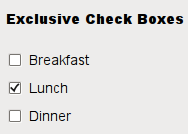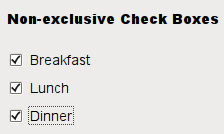QCheckBox Class
The QCheckBox widget provides a checkbox with a text label. More...
| Header: | #include <QCheckBox> |
| qmake: | QT += widgets |
| Inherits: | QAbstractButton |
Properties
- tristate : bool
Public Functions
| QCheckBox(const QString &text, QWidget *parent = nullptr) | |
| QCheckBox(QWidget *parent = nullptr) | |
| virtual | ~QCheckBox() |
| Qt::CheckState | checkState() const |
| bool | isTristate() const |
| void | setCheckState(Qt::CheckState state) |
| void | setTristate(bool y = true) |
Reimplemented Public Functions
| virtual QSize | minimumSizeHint() const override |
| virtual QSize | sizeHint() const override |
Signals
| void | stateChanged(int state) |
Protected Functions
| void | initStyleOption(QStyleOptionButton *option) const |
Reimplemented Protected Functions
| virtual void | checkStateSet() override |
| virtual bool | event(QEvent *e) override |
| virtual bool | hitButton(const QPoint &pos) const override |
| virtual void | mouseMoveEvent(QMouseEvent *e) override |
| virtual void | nextCheckState() override |
| virtual void | paintEvent(QPaintEvent *) override |
Detailed Description

A QCheckBox is an option button that can be switched on (checked) or off (unchecked). Checkboxes are typically used to represent features in an application that can be enabled or disabled without affecting others. Different types of behavior can be implemented. For example, a QButtonGroup can be used to group check buttons logically, allowing exclusive checkboxes. However, QButtonGroup does not provide any visual representation.
The image below further illustrates the differences between exclusive and non-exclusive checkboxes.
 |  |
Whenever a checkbox is checked or cleared, it emits the signal stateChanged(). Connect to this signal if you want to trigger an action each time the checkbox changes state. You can use isChecked() to query whether or not a checkbox is checked.
In addition to the usual checked and unchecked states, QCheckBox optionally provides a third state to indicate "no change". This is useful whenever you need to give the user the option of neither checking nor unchecking a checkbox. If you need this third state, enable it with setTristate(), and use checkState() to query the current toggle state.
Just like QPushButton, a checkbox displays text, and optionally a small icon. The icon is set with setIcon(). The text can be set in the constructor or with setText(). A shortcut key can be specified by preceding the preferred character with an ampersand. For example:
In this example, the shortcut is Alt+A. See the QShortcut documentation for details. To display an actual ampersand, use '&&'.
Important inherited functions: text(), setText(), text(), pixmap(), setPixmap(), accel(), setAccel(), isToggleButton(), setDown(), isDown(), isOn(), checkState(), autoRepeat(), isExclusiveToggle(), group(), setAutoRepeat(), toggle(), pressed(), released(), clicked(), toggled(), checkState(), and stateChanged().
See also QAbstractButton, QRadioButton, and GUI Design Handbook: Check Box.
Property Documentation
tristate : bool
This property holds whether the checkbox is a tri-state checkbox
The default is false, i.e., the checkbox has only two states.
Access functions:
| bool | isTristate() const |
| void | setTristate(bool y = true) |
Member Function Documentation
QCheckBox::QCheckBox(const QString &text, QWidget *parent = nullptr)
Constructs a checkbox with the given parent and text.
parent is passed on to the QAbstractButton constructor.
QCheckBox::QCheckBox(QWidget *parent = nullptr)
Constructs a checkbox with the given parent, but with no text.
parent is passed on to the QAbstractButton constructor.
[signal] void QCheckBox::stateChanged(int state)
This signal is emitted whenever the checkbox's state changes, i.e., whenever the user checks or unchecks it.
state contains the checkbox's new Qt::CheckState.
[virtual] QCheckBox::~QCheckBox()
Destructor.
Qt::CheckState QCheckBox::checkState() const
Returns the checkbox's check state. If you do not need tristate support, you can also use QAbstractButton::isChecked(), which returns a boolean.
See also setCheckState() and Qt::CheckState.
[override virtual protected] void QCheckBox::checkStateSet()
Reimplements: QAbstractButton::checkStateSet().
[override virtual protected] bool QCheckBox::event(QEvent *e)
Reimplements: QAbstractButton::event(QEvent *e).
[override virtual protected] bool QCheckBox::hitButton(const QPoint &pos) const
Reimplements: QAbstractButton::hitButton(const QPoint &pos) const.
[protected] void QCheckBox::initStyleOption(QStyleOptionButton *option) const
Initializes option with the values from this QCheckBox. This method is useful for subclasses that require a QStyleOptionButton, but do not want to fill in all the information themselves.
See also QStyleOption::initFrom().
[override virtual] QSize QCheckBox::minimumSizeHint() const
Reimplements an access function for property: QWidget::minimumSizeHint.
[override virtual protected] void QCheckBox::mouseMoveEvent(QMouseEvent *e)
Reimplements: QAbstractButton::mouseMoveEvent(QMouseEvent *e).
[override virtual protected] void QCheckBox::nextCheckState()
Reimplements: QAbstractButton::nextCheckState().
[override virtual protected] void QCheckBox::paintEvent(QPaintEvent *)
Reimplements: QAbstractButton::paintEvent(QPaintEvent *e).
void QCheckBox::setCheckState(Qt::CheckState state)
Sets the checkbox's check state to state. If you do not need tristate support, you can also use QAbstractButton::setChecked(), which takes a boolean.
See also checkState() and Qt::CheckState.
[override virtual] QSize QCheckBox::sizeHint() const
Reimplements an access function for property: QWidget::sizeHint.
© 2024 The Qt Company Ltd. Documentation contributions included herein are the copyrights of their respective owners. The documentation provided herein is licensed under the terms of the GNU Free Documentation License version 1.3 as published by the Free Software Foundation. Qt and respective logos are trademarks of The Qt Company Ltd. in Finland and/or other countries worldwide. All other trademarks are property of their respective owners.



